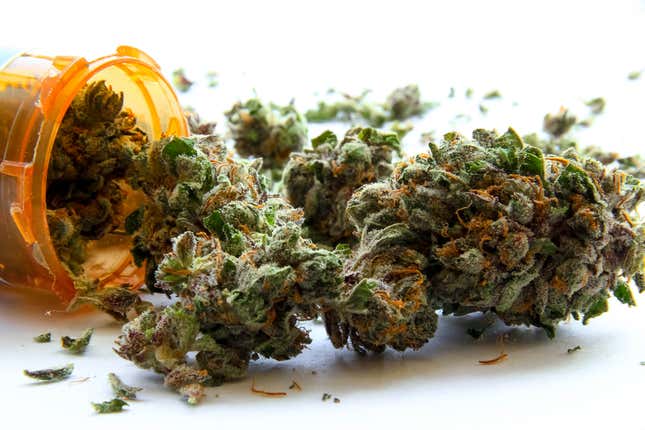
There was hope that when states like California voted to legalize marijuana, it would correlate with a reduction in marijuana related arrests for Black people. In Los Angeles, the opposite has proven to be true due to both a lack of access to legal means and red tape making it harder for Black entrepreneurs to break into the industry.
Crosstown reports that the number of Black people arrested on marijuana charges in L.A has steadily increased over the last three years, going from 173 arrests in 2017 to 239 arrests in 2018 and increasing again to 261 arrests in 2019. Last year, Black people made up 32.2 percent of marijuana related arrests despite only representing 8.9 percent of the city’s population. Comparatively, white people, who make up 28.5 percent of the city’s population, only accounted for 11.5 percent of marijuana arrests. The numbers come from data provided by the Los Angeles Police Department.
“Marijuana legalization can dramatically reduce arrests overall, including the numbers of arrests of people of color, but it can’t alone undo racially biased policing and the much larger issue of how and why we over and unfairly police some communities. And I think these numbers reflect that large problem.,” Tamar Todd, a civil rights lawyer who also serves on the California Cannabis Advisory Committee, told Crosstown.
In a press conference last month, California Gov. Gavin Newsom stated that legalizing marijuana was intended to reduce some of the racial disparities in the criminal justice system when it comes to drug charges. Judging by the numbers, it has inadvertently had the opposite effect and a large part of that stems from a lack of legal access. While predominantly white areas such as West Hollywood and Studio City have dozens of dispensaries, the entirety of South Los Angeles, which includes predominantly Black neighborhoods such as Watts, have less than 10 dispensaries registered in total. “Legalization creates legal access, but that access can be unequal. Those with the means to access limited legal supply, transport to a legal source, and private residence where they can legally consume reflect larger race and wealth disparities in society beyond marijuana,” Todd said.
From Crosstown:
Critics charge that the city’s process for granting licenses for marijuana dispensaries did not offer adequate opportunities to businesses in areas that had borne the brunt of repressive drug policies. The city’s Department of Cannabis Regulation announced a social-equity program last summer that would help applicants applying for ownership opportunities in the marijuana industry “in order to decrease disparities in life outcomes for marginalized communities and to address the disproportionate impacts of the War on Drugs.”
The Los Angeles City Council is also changing the criteria for people who qualify for the program to make sure that those hardest hit by unequal drug policies are able to benefit, since Black cannabis entrepreneurs are underrepresented. The city is also changing the rules about when cannabis companies can open in neighborhoods that already hit limits on the number of dispensaries.
So far, of the 411 marijuana arrests that have occurred in L.A this year only 20 of them were for smoking marijuana in public. The vast majority of the remaining arrests are filed as “possess marijuana for sale” or “transport/sell/furnish/etc.” An anonymous detective with the 77th St. Station told Crosstown that these arrests happen due an officer seeing someone selling marijuana or finding evidence such as baggies or scales that would lead them to believe the marijuana was not for personal consumption.
Nick Stewart-Oaten, an attorney with the Los Angeles County Public Defender’s office, told Crosstown that the police reports on these arrests typically don’t state that the officer actually witnessed a person selling marijuana. Instead, it’s far more common that the arrest is made due the officer assuming a person was selling marijuana due to the evidence such as possession of a large quantity of marijuana or something as simple as baggies.
“The problem is that many of the things that suggest a defendant was selling marijuana can be interpreted multiple ways and are not necessarily proof that the defendant was selling. For example, the fact that the defendant had a lot of marijuana could mean the defendant was selling, but it could also just mean the defendant likes weed,” Stewart-Oaten told Crosstown.
For its part, the NAACP has tried to take steps to address this ongoing issue. According to Ron Hasson, chair of the California-Hawaii State Conference Branch Development committee for the NAACP, the organization sent a series of proposals to both LAPD Chief Michel Moore and Mayor Eric Garcetti in June called “Black Community Wellness.” The proposal recommended multiple programs for the city to implement that would increase inclusion of Black people in the city’s marijuana industry.
“We are interested in having conversations with the LAPD to get more insight as to why the [arrest] numbers are going up for African Americans. Is it a result of racial profiling? It’s important that we understand how this law is affecting our community,” Hasson said.
Unfortunately, this trend only highlights the continuing reality that the law is not equally enforced between Black and white people. While legalization is a necessary step, it’s ultimately a half measure if it doesn’t include steps to ensure that Black people, who for so long bore the brunt of the war on drugs, are provided both ease of access to legal marijuana and a pathway to ownership when it comes to dispensaries.

